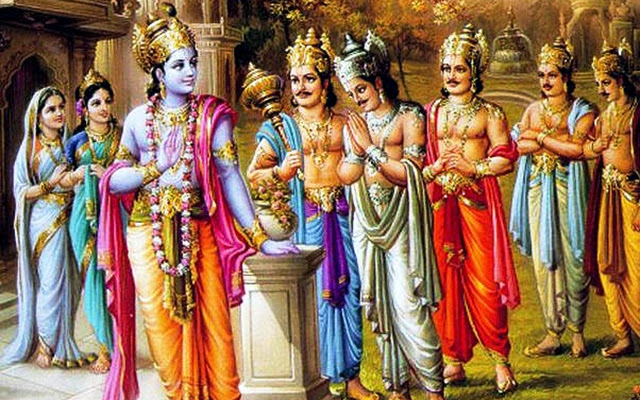Question: In the purport to Srimad Bhagavatam 1.15.46, Srila Prabhupada mentions that Pandavas performed supreme pious work in this life and also in their previous lives. But we have the understanding from Srila Prabhupada’s books that when Krishna appears in this material world to perform His pastimes, His eternal associates also appear along with Him to assist in His pastimes. So, can you kindly explain how the Pandavas, who are eternal associates of the Lord, have a previous life sukriti? I have similar doubt with respect to the life of Sri Narada Muni.
Answer by Romapada Swami: As eternal associates of the Lord, the Pandavas accompany the Lord wherever the Lord appears within the material universes to participate in His pastimes. Krishna reminds Arjuna that both Arjuna and He have passed many, many lives which Arjuna has forgotten but the Lord has not. (Bhagavad Gita 4.5) In all such births, the Pandavas remain liberated associates of the Lord, uncontaminated by matter. Thus all their activities were supreme pious work, being on the transcendental platform.
Bhaktivinoda Thakura identifies different categories of sukriti, viz. pious work aimed at fruitive enjoyment (bhoga-unmukhi-sukriti); aimed towards liberation (moksa-unmukhi-sukriti) and finally, pious action that awaken one’s devotion (bhakti-unmukhi-sukriti) which is the highest. Devotional activities such as hearing & chanting about Krishna, serving His devotees etc constitute this third type and are thus supreme pious work. [See Caitanya Caritamrita Madhya 22.45 purport]
One may mistakenly infer that although the Pandavas were very virtuous, their tribulations might have been the consequence of sins in a previous life, but this is refuted here by the above statement.
In the case of Sri Narada Muni, we understand from his personal account of his past life how his association with the Bhaktivedantas elevated him from the position of an ordinary and obscure son of a maidservant to that of a perfected, pure devotee. He offers this as a personal testimony to the fact that anyone from any position in life can attain the perfection of pure devotion. Once having attained spiritual perfection, past pious/impious background becomes inconsequential. For further discussion on this topic, see Digest 138.
There are many such examples in Bhagavatam which make it adequately clear that perfection in devotion is not simply exclusive to eternal associates or something to be admired but never to be achieved by common people.







